1939 Germany Marches On
On March 15th 1939, Hitler ordered his armies to move out of the Sudetenland and occupy the rest of Czech territory. Appeasement was dead. As the Nazis occupied Prague, the British and French governments only now sought to strengthen their alliance with Poland – the likely next victim.
 Occupied Europe Resists
Occupied Europe Resists
The Czech lands suffered brutal occupation by the Nazis, under Reichs ‘protektor’ Reinhard Heydrich. In 1942, Czech paratroopers trained in Britain assassinated the Aryan supremo. Jan Kubis (pictured), the Czech who threw the bomb that mortally wounded the man widely viewed as Hitler’s likely successor, attempted to flee Prague, but was cornered in the crypt of Prague’s Orthodox Cathedral on Resslova Street, Prague, along with six other Czech and Slovak paratroopers. On June 18th, having courageously resisted the force of over eight hundred German soldiers that surrounded them for hours, all six died, some from Nazi gunfire, some having used the last of their ammunition on themselves. Their decision to stand and fight in the face of certain death sent a message of hope, self-sacrifice and common struggle to occupied peoples resisting fascism the world over. Their final words “We are Czechs, we will never surrender.”
Poland Falls
Despite British and French guarantees to Poland, Germany invaded in September 1939. The Polish army collapsed after a brief but heroic resistance, and the Poles joined the Czechs as subjects of Hitler’s abusive Nazi empire, with millions of Poles perishing over the next six years..
 Churchill Takes Over
Churchill Takes Over
With British foreign policy in ruins and Hitler’s armies triumphant across much of Europe, Neville Chamberlain finally stood down as Prime Minister, and Winston Churchill took over, soon to become a war leader. France had fallen and Britain stood alone. The realisation of the folly of appeasement had come too late, and now it fell to its opponents to rebuild an International alliance that could resist the Axis military machine, and remould a world based on tolerance and collective security.





